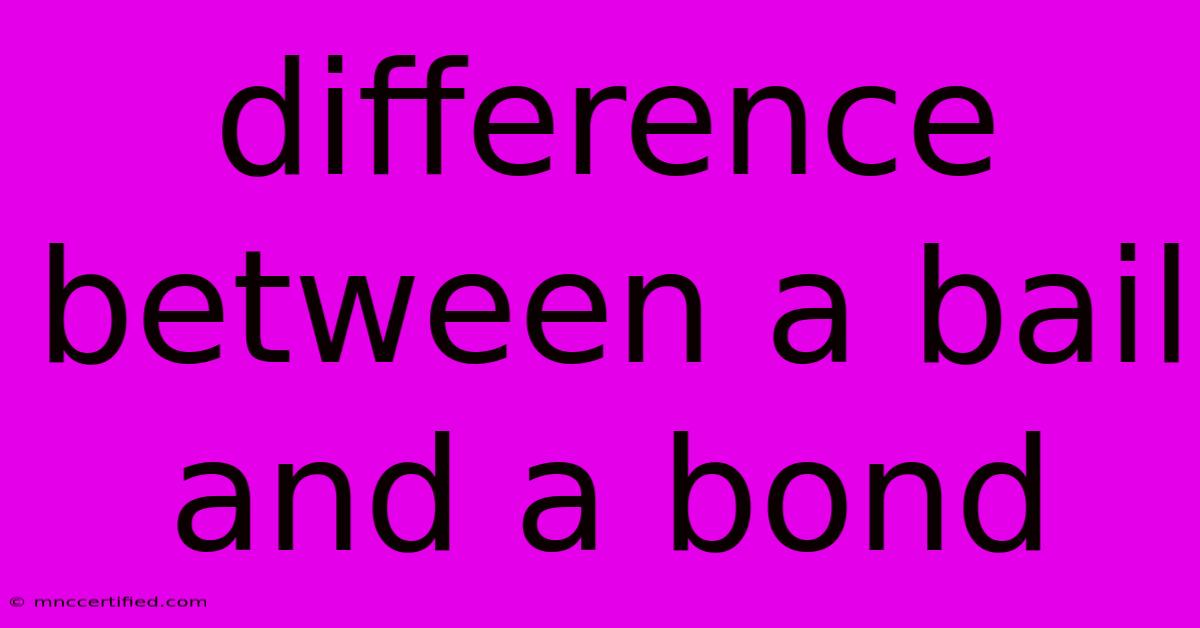Difference Between A Bail And A Bond

Table of Contents
What's the Difference Between Bail and Bond? Understanding Your Options After Arrest
Getting arrested is a stressful experience. It's even more overwhelming when you're faced with the possibility of spending time in jail before your trial. That's where bail and bond come in. These terms are often used interchangeably, but there are some crucial differences you need to understand.
What is Bail?
Bail is essentially a sum of money paid to the court to secure the release of a person accused of a crime. The purpose of bail is to guarantee the defendant's appearance in court for future hearings.
How does it work?
- Setting the Amount: A judge determines the bail amount based on the severity of the crime, the defendant's criminal history, and the risk of flight.
- Paying the Bail: The defendant, or someone acting on their behalf, can pay the full bail amount to the court. This money is held by the court until the case is resolved.
- Release from Jail: Once the bail is paid, the defendant is released from jail.
- Returning to Court: The defendant is legally obligated to attend all court hearings. If they fail to appear, the court can forfeit the bail money.
What is a Bond?
A bond is essentially a contract between the defendant and a bail bondsman. It's a financial guarantee that the defendant will appear in court.
How does it work?
- Contacting a Bail Bondsman: If the defendant cannot afford to pay the full bail amount, they can contact a bail bondsman.
- Paying a Fee: The bondsman charges a fee, usually a percentage of the total bail amount, in exchange for posting the bond.
- Release from Jail: The bondsman posts the bond with the court, and the defendant is released from jail.
- Fulfillment of the Bond: The defendant is legally obligated to appear in court. If they fail to do so, the bondsman is responsible for paying the full bail amount to the court.
Key Differences Between Bail and Bond
Here's a breakdown of the main differences between bail and bond:
| Feature | Bail | Bond |
|---|---|---|
| Source of Funds | Defendant or their family/friends | Bail bondsman |
| Payment Type | Full payment to the court | Fee to the bondsman |
| Liability | Defendant is responsible for the full bail amount | Bondsman is responsible for the full bail amount |
| Cost | Higher, as it's the full bail amount | Lower, as it's a percentage of the bail |
| Risk | Defendant faces losing the entire bail amount | Defendant faces potential legal consequences if they fail to appear |
Choosing the Right Option
The best option for you depends on your financial situation and the specific circumstances of your case.
Here are some things to consider:
- Your Financial Resources: Can you afford to pay the full bail amount, or do you need to consider a bond?
- The Complexity of Your Case: A bond might be more suitable if your case involves a lengthy legal process.
- The Risk of Flight: If there's a high risk of you failing to appear in court, a bond may be a safer option for you.
Remember, it's essential to seek legal advice**
The decision of whether to post bail or bond is a crucial one. Consulting with an experienced criminal defense attorney can help you understand your options and make the best decision for your circumstances.

Thank you for visiting our website wich cover about Difference Between A Bail And A Bond. We hope the information provided has been useful to you. Feel free to contact us if you have any questions or need further assistance. See you next time and dont miss to bookmark.
Featured Posts
-
Falcons Vs Saints Week 10 Locker Room Talk
Nov 11, 2024
-
Commercial Coverage Insurance Agency
Nov 11, 2024
-
Primeira Liga Predictions Benfica Vs Porto
Nov 11, 2024
-
Barcelona Loses To Real Sociedad 1 0 Pena The Hero
Nov 11, 2024
-
Man Utd Secure 3 0 Win Over Leicester
Nov 11, 2024